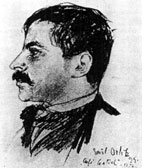Melusine (novel)
Melusine is Jakob Wassermann's first book publication , which was published in 1896 by Albert Langen in Munich with the subtitle “A love novel”.
The love of the young orphan Melusine Mirbeth for the 23 year old loafers stud. med. Vidl Falk is unhappy.
content
The setting is the modest Munich Pension Bender in Heßstrasse in Maxvorstadt . The medical student Vidl Falk can finally afford a room thanks to a scholarship. In Frau Bender's house he meets Fraulein Melusine, known as Mely. The young girl, from Sommerhausen , ran away in front of her guardian, Colonel Wolfgang Thewalt. Mely should really be grateful to her guardian. He had released her from a nine-year stay in the monastery and taken her into his house. But now the disappointed Colonel announced to Frau Bender in writing that he had fallen out with Fraulein Mirbeth and that he would therefore stop the payments. Soon Mely is penniless.
In extensive conversations, Mely and Vidl shyly get closer. Mely's answers to Vidl's almost inquisitorial questioning contain lies and leave many of his questions open. For example, Mely denies her sister Cecilia. Without showing any feelings for her past, Mely looks back on her time as housekeeper to the widowed Colonel. Vidl's love is returned. Mely allows her to put her hand on Vidl's bare chest, but the young man keeps asking his sober questions afterwards. Vidl's response to this increasing insistence on Mely's relationship with the colonel was incomplete. From one of the passages in question it could be read that the colonel wanted to sleep with Mely and the young lady had evaded the urgent need for love by fleeing to the Bender guesthouse. Mely's situation is hopeless. She remains financially dependent on the jealous colonel. So the girl - to Vidl's chagrin - has to answer the guardian call again and again. Mely is torn. At first she turns away from Vidl, but in the end the narrator suggests that the young couple are spending a night of love. However, Vidl thinks he has evidence of Mely's infidelity and separates from her. After throwing away a considerable fortune that he had unexpectedly inherited towards the end of the novel, he marries someone else. The narrator is silent about Mely's further fate.
Self-testimony
Wassermann tells the story of over three years of love for a woman from his life: "I love this girl insanely, and she loves me more than anything, but we both torture each other to the point of madness."
Form and interpretation
The text - which is psychologically relatively profound for Aquarius beginners - consists of sixteen chapters and a “conclusion”. The omniscient narrator inserts Vidl Falks' diary entries into his lecture twice.
Basically, Vidl Falk and of course the reader also want to know whether Mely is sleeping with the Colonel or not. While Vidl is convinced of the fact, the reader can choose the yes-no answer to that delicate question that suits him. Because all statements on the crucial "subject" are based on defamation or ultimately on not very credible written statements by the Colonel.
Vidl is the weak character. He does not trust the beloved, but spies on her, cannot cope with the enigmatic Melusine appearance, doubts and desperates. Mely, the strong character, has to fail because of the weakness of the lover.
Towards the end of the novel, the saving, rich heirloom Vidl suddenly falls from heaven like a deus ex machina and, with prompt death, releases the inheritance.
reception
- The round of Wassermann's works, otherwise full of action, have a poor start.
- Sprengel points out the autobiographical traits mentioned under “self-testimony” and tears the text down as trivial; owed to the water woman's weakness at the time.
literature
Primary literature
- Jakob Wassermann: Melusine. Novel. Salzwasser Verlag, Paderborn 2011, ISBN 978-3-943185-46-1 .
Secondary literature
- Rudolf Koester: Jakob Wassermann . Morgenbuch Verlag, Berlin 1996, ISBN 3-371-00384-1 .
- Peter Sprengel : History of German-Language Literature 1900–1918. From the turn of the century to the end of the First World War. CH Beck, Munich 2004, ISBN 3-406-52178-9 .
Web links
- The text at Gutenberg-DE
Individual evidence
- ^ Koester, p. 89, entry 1896.
- ↑ Munich Wiki Heßstrasse
- ^ Aquarius: Melusine. 2011, p. 66 middle
- ^ Aquarius: Melusine. 2011, p. 115, 13. Zvo
- ^ In Koester, pp. 15, 15. Zvo, quoted from a letter (source: Marta Karlweis , Amsterdam 1935)
- ^ Aquarius: Melusine. 2011, pp. 27–36 (7th chapter) and pp. 99–108 (14th chapter)
- ^ Aquarius: Melusine. 2011, p. 76, 10. Zvu, p. 82, 12. Zvo and p. 93, middle
- ^ Aquarius: Melusine. 2011, p. 110, 3. Zvo
- ^ Aquarius: Melusine. 2011, p. 65, 5. Zvo
- ^ Aquarius: Melusine. 2011, p. 89, 11. Zvo and p. 89, 16. Zvu
- ↑ Koester, p. 15, 7th line from
- ↑ Sprengel, p. 382, 4th line from above
